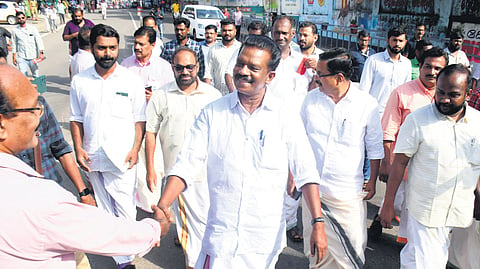

THIRUVANANTHAPURAM: For successive Lok Sabha elections, the voters of Kerala have rejected the politics put forward by the CPM. Unlike in 2019, when the Rahul Gandhi factor and the Sabarimala protests played major roles, there was no such game-changing issues this time.
This general election was fought on the anti-incumbency factor against the Narendra Modi government and against the sitting UDF MPs. Then there was the anti-incumbency factor against the Pinarayi Vijayan government over a series of issues, ranging from the controversy surrounding chief minister’s daughter Veena T to the failure to release welfare pensions and provide service benefits to government servants.
The CPM charted its game plan based on the issue of the protection of minorities, especially Muslims, and the protection of the Constitution. From Pinarayi to state leaders, the CPM raised the Citizenship Amendment Act and the Palestine issue and tried to put Congress on the defensive for its alleged lack of a strong stand.
The issue of federalism, which the LDF government took to the Supreme Court, and the protest organised in New Delhi against the Centre’s neglect became secondary issues. “The results show that the party miscalculated the mindset of a majority of voters in the state,” a senior CPM leader told TNIE. “CPM’s campaign was focused around the Palestine issue and the anti-CAA sentiment. We ignored other political issues such as the state being neglected by the Centre and developmental politics.”
In the end, the Muslim minority stuck to their traditional front, he said. “The pro-Muslim rhetoric has resulted in the erosion of CPM’s traditional Hindu votes to the BJP. If you look at the election campaign, Congress was silent on these matters. They too benefited in the end,” he said. Suresh Gopi’s landslide victory has sent shockwaves across the Left circles. According to their calculation, in a constituency where the Christian and Muslim minorities have a sizeable number, the victory of the saffron party was impossible.
“With this result, bipolar politics has come to an end in Kerala,” political analyst Ajith Sreenivasan said.
He said in many constituencies BJP candidates have got over a lakh votes and the difference between them and CPM candidates is very thin. “The BJP, after a decades-long attempt, successfully brought together the Hindu community beyond the caste separation for the first time. Earlier, the BJP received a majority of the Nair community votes. However, the pattern in this election shows the BJP has gone beyond that. Without support from the Ezhava community, they could not have made this progress. This may not be a trend in the coming assembly elections,” Ajith said.
On Friday, the CPM state secretariat is slated to look into the reasons for the debacle. The results show that the Muslim minority and the liberal-secular voters view the Congress, rather than the CPM, as the alternative to the BJP.
The huge victory margins registered by Congress candidates in constituencies where minorities have sizeable numbers, barring certain seats, and the increase in the vote share of BJP candidates in seats like Kannur, Vadakara, Alappuzha, Pathanamthitta and Attingal would be question marks before the leadership.
25.82% votes were garnered by the CPM in the state
1 win in 15 seats
Of the total 15 seats — Kasaragod, Kannur, Vadakara, Kozhikode, Malappuram, Ponnani, Palakkad, Alathur, Chalakkudy, Ernakulam, Idukki, Alappuzha, Pathanamthitta, Kollam and Attingal — the CPM contested in, it managed to win just the Alathur seat.
Anti-incumbency against sitting MP Remya Haridas of Congress helped CPM clinch the seat